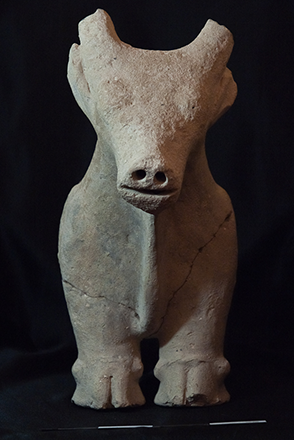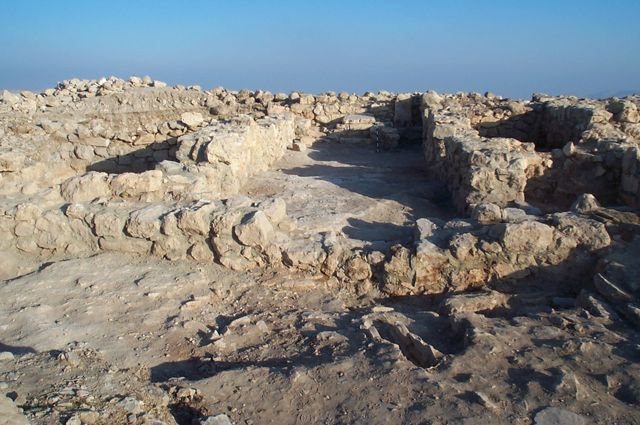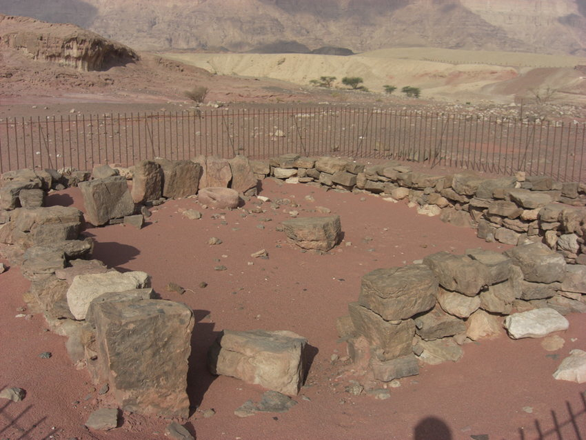You are here
Uncovering Iron Age Cultic Structures at Khirbet Altaruz
By Saeb Rawashdeh - Nov 14,2024 - Last updated at Nov 14,2024

Bull statue found at Khirbet Ataruz, 9th century BC (Photo courtesy of J Park)
AMMAN — On the eastern side of the temple complex at Khirbet Altaruz, a low platform was discovered in 2010 with small altar on the top and at the base of the platform, a stone step was found with two small stone columns on either side.
"The first column contained an inscription on one side that dated to the late 9th-early 8th centuries BC. The second stone column had a square shaped top incorporated into the column with a shallow depression that might have been used to burn incense or hold torch-fire inside," said the professor Chang-Ho Ji from La Sierra University.
“Later excavations had aim to determine the relationship of this platform and step with the nearby walls. Excavations revealed an Iron IIA – IIB courtyard and a raised rectangular platform that was built for cultic activities,” Ji continued, adding that on the south side a three-step staircase was discovered that connected this courtyard with the Central Courtyard near the Main Sanctuary.
"This staircase was the entrance for the courtyard when the platform altar was first built. Priests from the Iron IIA period probably approached the platform from the Central Courtyard facing the rising sun. Later in Iron IIB, this entrance was blocked off in order to put a square fireplace or furnace in the corner," Ji highlighted.
“In addition, most of the staircase was covered with soil, and the covered section was incorporated into the earth-beaten floor. On the floor of the courtyard three large irregularly shaped flat stones were found near the western wall directly in front of the platform and were probably used as offering tables,” the scholar said, adding that the floor, fireplace, and offering stones were all contemporary with the stone columns found in 2010.
"By the late 9th century BC, the area was transformed into a partially enclosed courtyard surrounded on four sides by the platform and three walls and was probably entered only through a narrow alley from the southeast and the courtyard was reused later in the late Hellenistic period," Ji said.
The 2012 season centred on the architectural details located on the north and south side of the platform.
"Excavation showed that this room was originally built in the Iron IIA period and then later reused in the late Hellenistic period, where a small lamp was found. In this area, four earth beaten floors dating to the Iron IIA – IIB periods were also found. The earliest floor was made during the mid Iron IIA period when the Main Sanctuary and its Central Courtyard were at its peak usage," Ji underscored.
Furthermore, the wall associated with this Iron IIA floor was built in two courses with chink stones; Its stones were medium-sized, relatively well dressed, and laid with much care. A later floor was added in the early Iron IIB period, where an
iron javelin and complete cooking pot (Figs. 12-12b) were found, he stressed, adding that during this later phase, a different construction technique seems to have been adopted. The walls consisted of only one row of large-sized boulders.
"These two early walls were reused in the mid and late Iron IIB periods whose residents also laid two earth-beaten floors above the earlier ones. During the 2007 season the project identified a late Hellenistic floor in the area, which was similar to thelate Hellenistic earth-beaten floor found in the rooms," Ji elaborated.
The excavations at Khirbet ‘Ataruz continue to expose Iron Age II remains.
"The 2011-12 excavations in Fields E and F along the northern and eastern outskirts of the ‘Ataruz temple compound have found important buildings and cultic installations. In particular, the findings established a date for the inscription column, its relationship to the altar, and the nature and chronology of the Inscription Column Courtyard," Ji concluded.
Related Articles
AMMAN — Khirbat Ataruz is located 24 kilometres south of the town of Madaba, 10 kilometres west of the village Libb and 3 kilometres east of
AMMAN — Khirbet Ataruz, located around 30 kilometres southwest of Madaba, represented an early Iron Age II temple with two building phases,
AMMAN — The religion of the people who lived in the Syro-Arabian Desert and the steppes during the final phase of the Late Bronze and the Ir



















